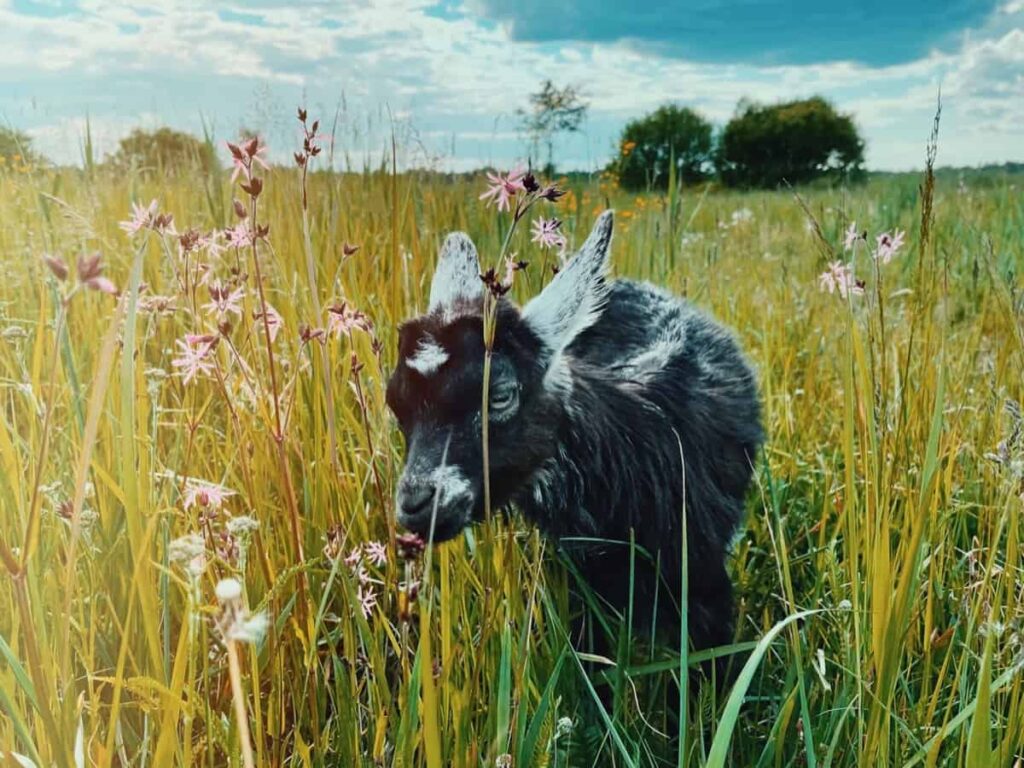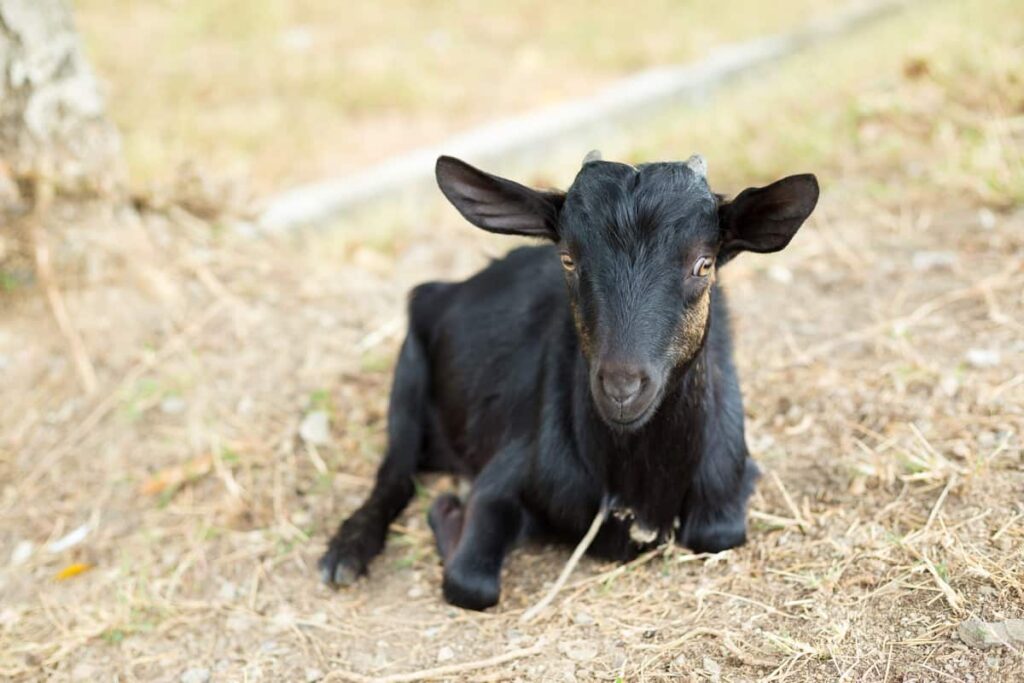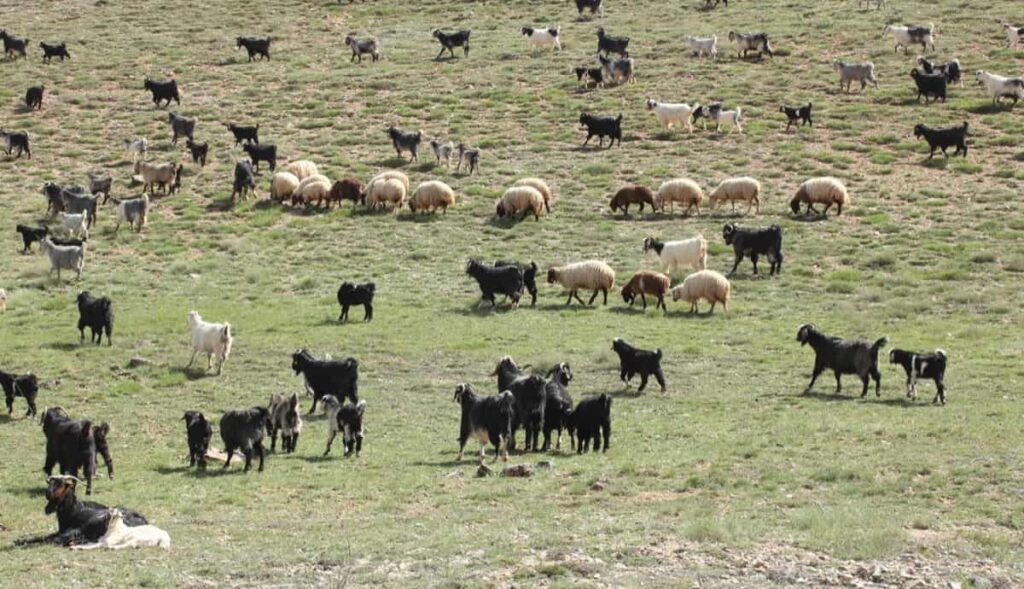The Zalawadi goat is a remarkable breed from the Surendranagar and Rajkot regions of Gujarat, India. These goats are highly valued for their ability to produce milk, meat, and fiber, making them a versatile choice for farmers. Providing them with a nutritious diet of minerals and vitamins ensures optimal growth and productivity.

Zalawadi Goat Breed Profile
Housing Management for Zalawadi Goat Farming
- Ensure that you have enough space available for your herd. These goats require ample grazing areas, so make sure you have enough pasture or browse available.
- Next, providing proper fencing is crucial to keep your goats secure and prevent them from wandering off. High-quality fencing materials such as woven wire or electric fences can effectively keep predators at bay and protect your herd.
- Constructing a sturdy and well-ventilated shelter is essential. The shelter should protect from extreme weather conditions such as heavy rain or harsh sunlight.
- Additionally, make sure that the flooring of the shelter is easy to clean and provides good drainage. This will help in maintaining hygiene and preventing diseases caused by damp bedding.
Zalawadi Goat Characteristics
- One characteristic is its adaptability to various climatic conditions, making it well-suited for farming in different environments.
- One distinctive feature of the Zalawadi goat is its beautiful coat. The fur can vary in color but is often black or brown with white patches on the face or body. This striking appearance adds to their appeal as show animals.
- In terms of milk production, Zalawadi goats have good milking potential. They can produce substantial milk with high butterfat content, making it suitable for personal and commercial consumption.
- Furthermore, these goats exhibit excellent reproductive efficiency. They have a high fertility rate and are known to birth multiple kids per kidding season. This makes them ideal for breeding programs aimed at increasing herd size.
Zalawadi Goat Weight
The weight of Zalawadi goats is an important factor to consider when raising these lovely creatures. On average, adult male Zalawadi bucks weigh around 39 kg, while the females, known as does, typically weigh about 33 kg. Maintaining a healthy weight for your goats is crucial for their overall well-being and productivity. Proper nutrition is vital in achieving and maintaining the ideal weight for your Zalawadi goats.
What is Required for Zalawadi Goat Farming?
- Zalawadi goat farming is a rewarding venture that requires careful planning and preparation. Firstly, you will need suitable land for grazing and shelter for the goats. The land should have adequate vegetation to provide a natural food source for the goats.
- When it comes to shelter, ensure it is well-ventilated and spacious enough to accommodate the growing herd.
- Next, consider the fencing requirements. A sturdy fence is essential to keep predators out and prevent your goats from wandering off. Ensure the fence is high enough so they can’t jump over or squeeze through gaps.
- Feeding plays a crucial role in Zalawadi goat farming. These goats thrive on a diet of green fodder, such as grasses, legumes, and shrubs.
- Regular health check-ups are vital in ensuring the well-being of your Zalawadi goats. Find a reliable veterinarian who can provide vaccinations and deworming treatments as needed.
In case you missed it: Best Practices for Disease Prevention and Management in Goats: Strategies for Maintaining a Healthy Herd

Feeding and Care for Zalawadi Goats
- It is essential to ensure their overall health and productivity. Zalawadi goats feed on grass, shrubs, leaves, and other vegetation. They are known for their ability to graze on low-quality forage, making them well-suited for harsh environments with limited resources.
- Supplementing their diet with concentrates such as grains or commercially available goat feed can provide the nutrients they may not get from grazing alone. It’s important to give them access to fresh water at all times.
- In addition to proper nutrition, regular veterinary care is crucial for the well-being of your Zalawadi goats. Regular vaccinations and deworming help prevent common diseases and parasites affecting their health.
- Providing adequate shelter is also vital in ensuring the comfort of these animals. A sturdy shed or barn that protects them from extreme weather conditions like heat, cold, rain, or strong winds will keep them safe and healthy.
- Zalawadi goats need space to roam freely. A fenced-in area where they can graze, and exercise will contribute to their overall well-being.
How to Care for the Zalawadi Goats?
- Caring for Zalawadi goats is essential to ensure their overall health and productivity. These hardy animals require proper attention and care to thrive in different environments.
- Providing adequate shelter is crucial. The housing should protect them from extreme weather conditions such as excessive heat or cold. Ensure the shelter has good ventilation and enough space for the goats to move around comfortably.
- Feeding plays a vital role in maintaining the well-being of Zalawadi goats. A balanced diet consisting of quality goat feed, fresh water, and access to grazing pasture is necessary. Supplementing their diet with minerals and vitamins will help meet their nutritional requirements.
- Regular health check-ups are a must for Zalawadi goats. Vaccinations against common diseases like foot rot, pneumonia, and parasites should be administered timely by a veterinarian. Proper sanitation practices also help prevent disease transmission within the herd.
- Maintaining cleanliness in the living area is crucial for preventing infections and diseases among Zalawadi goats. Regularly clean their bedding, feeding troughs, and water containers to ensure optimal hygiene.
- Spend time observing your Zalawadi goats daily so you can detect any signs of illness or distress early on. This way, prompt action can be taken if needed.
- Caring for Zalawadi goats involves providing proper shelter, nutritionally balanced diets, regular veterinary care, hygiene maintenance, and attentive observation.
Health Care Tips for Zalawadi Goats
- Regular Veterinary Check-ups: Schedule regular visits from a qualified veterinarian who can provide vaccinations, deworming, and general health check-ups for your goats. This will help prevent diseases and address any health issues promptly.
- Proper Nutrition: Ensure that your Zalawadi goats have access to a balanced diet of good quality hay or pasture grass supplemented with grains or commercial goat feed as needed.
- Parasite Control: Implement an effective parasite control program to manage internal and external parasites such as worms, ticks, and lice. Regularly monitor your goats for signs of infestations and administer appropriate treatments as a vet recommends.
- Hygiene Management: Maintain proper cleanliness in the goat housing area by regularly removing manure and keeping the surroundings dry to prevent the growth of bacteria or fungi that could cause infections.
In case you missed it: Marketing Trends/Strategies and Opportunities for Goat Products

Conclusion
The Zalawadi goat offers a multi-purpose solution with milk, meat, and fiber production capabilities. This makes them ideal for dairy farming operations as they can provide a steady supply of nutritious milk. For successful Zalawadi Goat farming, proper land preparation and shelter construction are essential. A suitable environment will provide comfort while protecting them from extreme weather conditions. Additionally, having adequate space for their movement is crucial for their physical development.
Note: The images presented in this post are intended solely for representation purposes. The images are meant to serve as visual aids and should not be relied upon as accurate representations of their real-life counterparts.
- Goat Milking Practices and Equipment: A Beginner’s Guide
- Goat Farming for Fiber: Producing Mohair and Cashmere
- Maximizing Goat Milk Production: Tips for Dairy Goat Farmers
- Goat Farming as a Family Business: Strategies for Success
- Profitable Kenya Goat Breeds for Commercial Dairy and Meat Business
- Unlock the Secrets of Oberhasli Goat: Discover Raising and Management Practices
- Ultimate Guide to Myotonic Goats: Explore Profile to Raising
- Unlock the Secrets of Rove Goat: Discover Management Practices
- Ultimate Guide to Malwa Goat: Explore from Origin to Management Practices